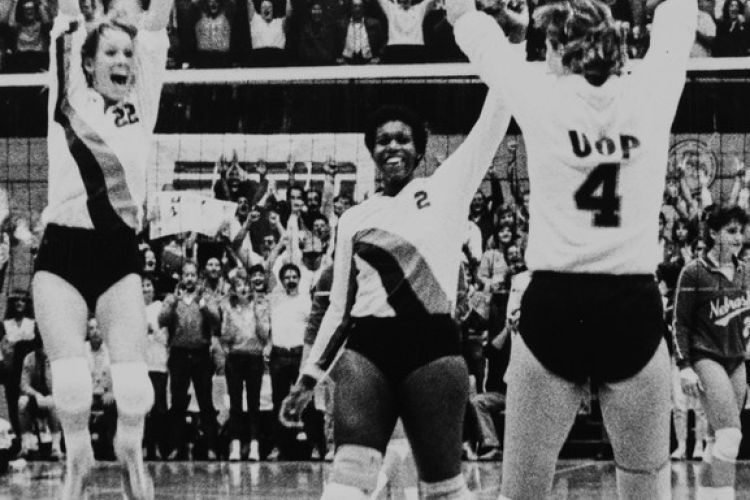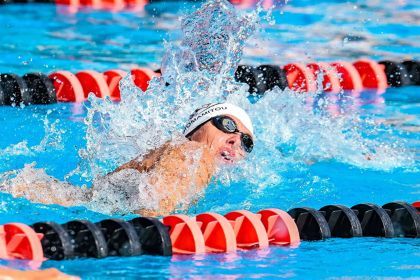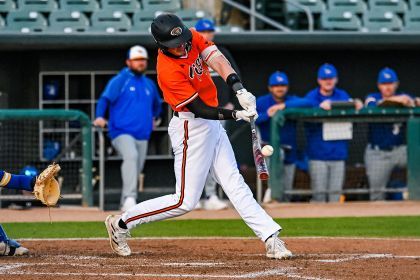Breadcrumb
Early pioneers helped Pacific women’s athletics grow

All-American Elaina Oden, center, helped lead Pacific to the 1985 and 1986 NCAA volleyball championships. She also was a member of the bronze medal-winning United States team in the 1992 Olympics.
The building of a foundation for University of the Pacific’s women’s athletic program was explored and celebrated in the Sept. 8 session of the Tiger Talk series, sponsored by Pacific Athletics.
A panel of five delved into how the impact of Title IX, gender equity awareness and seminal moments in the 1970s and ’80s contributed to the growth of women’s athletics at Pacific.
“I graduated from high school the year Title IX was enacted [1972]. When I got to Pacific, we had tennis and swimming. That was basically it for women’s athletics,” said Cindy Spiro ’76, a former Pacific athlete, coach and administrator who now works for the University of California, Davis. “I was clueless about what was going on until my sophomore year when I did an independent study with athletic director Cedric Dempsey. He was at the forefront of establishing the first Northern California intercollegiate athletics conference.
“I did some legwork for him, looking into Title IX and the potential ramifications. My junior year was when basketball and volleyball were started for women. We had one set of uniforms. They were this ugly polyester, scratchy material.”
Title IX, which became law in 1972, states: “No person in the United States shall, on the basis of sex, be excluded from participation in, be denied the benefits of, or be subjected to discrimination under any education program or activity receiving Federal financial assistance."
Glena Carroll ’77 was a volleyball player who became the first woman to receive an athletic scholarship at Pacific.
“There were many things that came from Title IX. Along the way, it became known around the country mostly for gender equity as it pertained to women’s athletics,” said Carroll, who is married to Seattle Seahawks Coach Pete Carroll ’73. “We are all sitting here today having benefited from Title IX and its impact.”
In 1979, the year Spiro took over as administrator of the women’s athletic program, her salary was $10,000. Women’s athletics had an operating budget of $12,000 and men’s athletics had “more than $440,000,” she said, adding that all women’s coaches shared one telephone from which to recruit.
“You realize that it was athletic inequality in its infancy with what Glena and Cindy are talking about,” said panelist Brian Kolze, Pacific softball coach for the past 29 years.
Carroll said the hiring of Terry Liskevych as volleyball coach helped spur Pacific athletics to strive for more. He built the program into a national contender before leaving after the 1984 season to become coach of the United States women’s volleyball team. He was replaced by John Dunning, who led the Tigers to NCAA championships in his first two seasons.
The pinnacle of Pacific women’s athletics during the 1980s were those two NCAA volleyball championships, in 1985 and 1986.
“Those championships were the culmination of so many years of hard work and passion put into the program,” Spiro said. “I was in the stands for the second title, which we hosted. I had so much pride in my school.”
Other panelists expressed gratitude and admiration for the athletes, coaches and administrators who helped get Pacific women’s athletics started.
“It’s phenomenal how far women’s sports have come,” said Kendall Dentoni (Kenyon) ’15, a basketball standout who holds the school record for most career rebounds (1,140). “I have learned a lot today just listening to the talk about Title IX and what they had to overcome. To have everything that we had when I played seems amazing.”
Katelyn Herrington, Pacific men’s and women’s swimming and diving coach, added, “Just look at the different facilities upgrades we have had, including the electronic scoreboard and seating area. It is amazing to have that championship environment. It is hard to relate to all that they had to overcome in the 1980s. You have to be very appreciative.”
Fast forward to 2020, where Pacific has a woman, Janet Lucas, as athletic director, leading a program with 10 women’s sports teams.
“This was a special Tiger Talk because we heard so many different perspectives,” Lucas said. “I could relate to so many of the things Cindy and Glena were talking about.”
Lucas played two intercollegiate sports (basketball and volleyball) and one club sport (softball) at Wake Forest University. In her 41 years as a college athletic administrator, she has worked at six universities: Baylor, Maine, James Madison, California State Univeristy-Northridge, University of California-Riverside and Pacific.
“I went through a lot of ‘firsts,’ just as they did here at Pacific,” Lucas said. “It was a pleasure to hear the reflections on how the Pacific program was built. They set a great foundation.”





